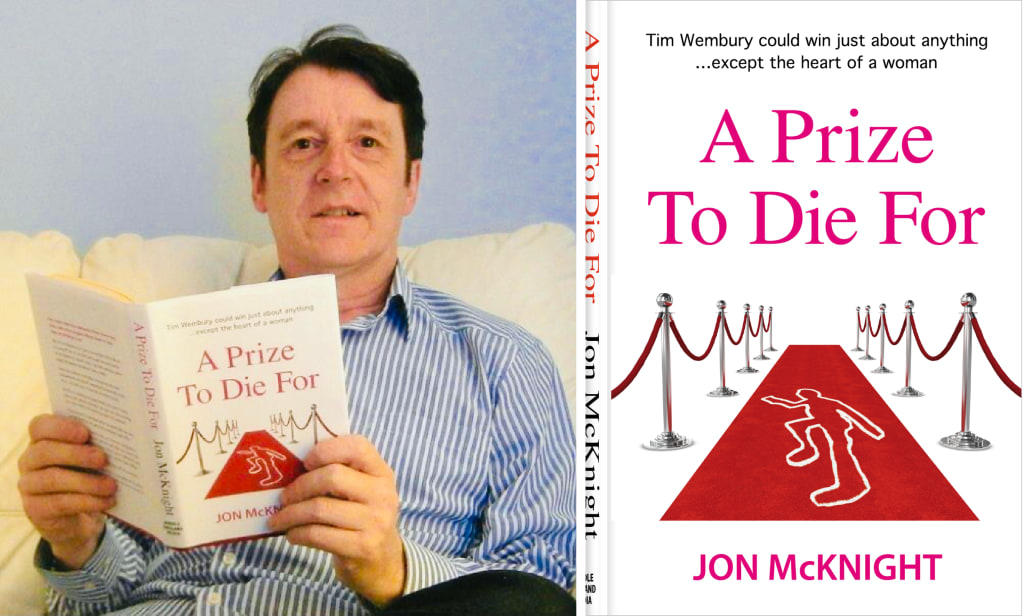How to go the distance when you’re writing a novel
Third in a series of writing tips exclusively for Vocal

We all have a novel inside us, apparently, but the problem is getting the damned thing out.
Some compare it with giving birth to a child - which, my female friends assure me, can certainly make your eyes water, to say the least - but for most aspiring authors, it can seem rather more daunting than that.
If all the first-chapters-of-novels in all the world’s drawers had made it all the way into print as fully-fledged, full-length paperbacks, there wouldn’t be a single tree left in any forest and we could spend the remaining years until our self-inflicted demise in the ensuing climate catastrophe actually reading them - A Book At Armageddontime, as the BBC World Service would probably call it.
But the vast majority of those first chapters are destined to remain just that: pieces of potential that were never quite realised.
The celebrated wit Peter Cook, in one of his most famous sketches, is chatting to another man at a cocktail party.
“I’m writing a novel,” the man tells him.
“Neither am I,” replies Peter Cook.
And therein lies a truth: most people dream of having written a novel, and want to be admired for having done so, but the number who actually do write one is infinitely smaller.
So how do you go about it?
Assuming you have an idea for one (and if not, see my how-to piece), the next thing is to decide which voice to use for it (in which case, you might wish to read this).
Once you’ve decided on those two crucial aspects, you can start writing.
The number of first-chapters-in-drawers suggests that most of us are able to throw that six to start, to get over that first hurdle, to start as we mean to go on - but then the doubts set in.
Can we go the distance?
That’s exactly how I felt, 30 years ago, when my first novel began to burst out of me. I’d wanted to write one for so many years, but had put it off, didn’t have the confidence, and wondered if I’d ever get around to it.
Then, like a premature baby declaring “Coming, ready or not!”, my creative waters broke and the novel began to emerge. There was nothing I could do about it.
Like most unscheduled births, the timing wasn’t ideal. I was working as a journalist on a daily newspaper and I couldn’t ask for compassionate leave or emergency time-off just because I felt a novel coming on.
So I had to work around it.
Writing the novel, getting it down on paper, began to take over my life. I woke up unaccustomedly early in the morning, wrote for a few hours before going into the newspaper office, worked my eight-hour shift, rushed home, and began writing again, struggling to get it down on paper fast enough as I worked way into the wee small hours before beginning the whole process again.
On my days off, I sat in a French cafe and wrote and wrote, even setting some of the scenes there, then came home and wrote some more until I snatched a few hours’ sleep and dreamed of what I’d be writing next in the morning.
Some friends were very supportive and acted as a sounding-board as I wrote. I’d whizz over PDFs of the pages as I produced them, and they’d tell me if it was all making sense. According to them, it did.
And, 23 days after I’d started, I had a finished novel. Eighty thousand words, 243 pages, and a lot of chapters to go with that first one.
Father and baby were doing well.
But I haven’t told you how I went the distance, merely that I did.
I’d been totally unsure that I could ever write a whole novel, and I was afraid of writing and writing and finishing what I thought was one, only to find that it was about a third of the required length once it had been put into type.
So I did something I hadn’t heard of anyone doing before. I decided to watch the novel materialise in front of my very eyes and begin to look like one right from the start.
I bought the best-selling hardback at the time, Paddy Clark, Ha Ha Ha by Roddy Doyle, and decided to make mine exactly the same length.
I measured the pages, counted the lines of text and even bought the font it was typeset in - Sabon - then set up a template in the page-design software Quark Xpress so I could fit two pages, side-by-side, on a sheet of A4 paper in landscape.
I imitated the hardback’s layout in every respect, even writing dummy text into the template and counting the words so I could be sure I was producing something that was like-for-like the same (in quantity, if not quality!) as Roddy Doyle’s novel.
And I set up automatic page-numbering so I could see at a glance how far I’d got at any given point in the process.
Then I began writing. After a few false starts, I had my intro, my opening paragraph. My first word was Tampax which I hoped would raise a few eyebrows, coming from a male novelist in those oh-so-buttoned-up days.
As I typed, my words really looked like they were from the pages of a published novel, and the more I typed, the more pages began to accumulate.
My plan was working.
One I’d finished the first two pages, I printed them out on the one A4 sheet and laid it on the floor of my spare room.
I added another, and another, laying them in a row until it stretched from one side of the room to the other.
As the evidence of my emerging novel grew more and more visible, my confidence increased, and I became all the more determined to make it to the end of Row Two. And so on.
The rows grew, taking up more and more of the room, until, quite a way into the novel, I was like a man who’d painted himself into a corner and could no longer move without stepping on it. Or tripping over my words, if you like.
I’d run out of space, but by that time I no longer needed the ploy; I knew I could go the distance, and it was all I could do to stop myself writing, feeling at times like Mickey Mouse when he’d been taken over by unseen forces in The Sorcerer’s Apprentice and couldn’t stop if he’d wanted to.
And although I did a decent day’s work for the newspaper on the 14 days of the 23 it took to produce my novel, my day-job became a mere interruption, an irritation, in what had become my “writing day”.
There’s a chap on Facebook now who offers to tell you - or sell you - the secret of how to write a novel in 30 days.
“What kept you?” I asked him in a comment, but he must have been too busy taking people’s money to answer me or explain how, without his help, I’d managed to beat his target by a clear week.
But what of the novel itself?

It’s out there, it’s called A Prize To Die For, and if you’d like to see what a novel written in only 23 days looks like, you can find it on Kindle in the UK and in the USA and elsewhere.
It’s about a young man, so obsessed with entering competitions that he buys 96 tins of cat food for a cat he hasn’t got, just so he can send in the labels in the hope of winning an eye-watering income for life.
The competition, though, was fixed by a desperate promoter, and the prizewinner was supposed to be a little old lady who’d be so shocked at her win that it would shorten her life and, therefore, the cost of the prize to the promoter.
Our hero, 30, wins by accident, and the promoter realises just how much the prize will cost the company if he lives. If he lives...
It’s a comic novel, set in real-life locations, and those who reviewed it on Amazon were kind enough to say, among other things:

“The writing is achingly funny. I'd cheerfully read this over and over again - after a necessary period of recovery. Highly recommended.”

“It has humour, romance, a wonderful setting and flawed yet believable characters. It is well worth a read. It is really difficult to put down.”

“Reminds me in places of some of the Tom Sharpe books.”

“Not many books make me laugh out loud and hoot with delight, but this one did.”

“The story is fast moving and very amusing. The end came as a surprise. Well worth buying.”

“This book made me snigger, titter, smile and laugh out loud. The puns and subtle witticisms are cleverly woven into the story. The unlikely hero of the story is well conceived and his self-doubt and self-deprecations ring true with the reader. I loved it! It is one of the best books I have had the pleasure of reading. A thoroughly enjoyable and entertaining story.”

“A great plot, very funny and witty. Cleverly written, and enjoyable whether you're into 'comping' or not.”

“Funny, witty and very readable.”

“If you enjoy a giggle then you will love this saucy little number. Full of intrigue and daring do. Very clever.”

“An excellent and hilarious read that I would thoroughly recommend to all. I look forward to the next book from Jon McKnight.”

If you are in the film industry (or know someone who is), please think about making this into a film. It would make a refreshing change from what's out there at the moment. In these difficult times, we all need to enter the mysterious, bizarre and naive world of Tim Wembury and escape from the bitter realities of ours.”

“A Prize To Die For is an extremely amusing novel with a plot that twists and turns more frequently than a politician’s tongue at the run-up to an election.This book will live alongside the works of that master of written comedy, Gerald Wiley (the pen-name of comedian Ronnie Barker).”

“Good story and kept me guessing.”

Enough! Enough! But if a novel knocked out in 23 days can make those strangers that happy, imagine what you can achieve with yours.
So get it out of that drawer and into the bookshops. We’re all waiting to read it!
• Jon McKnight (as you have just read) is the author of the comic novel A Prize To Die For, available for Kindle in the UK and in the USA and elsewhere.
You can read some of his other stories for Vocal+ here:
About the Creator
Jon McKnight
I have left Vocal.






Comments
There are no comments for this story
Be the first to respond and start the conversation.